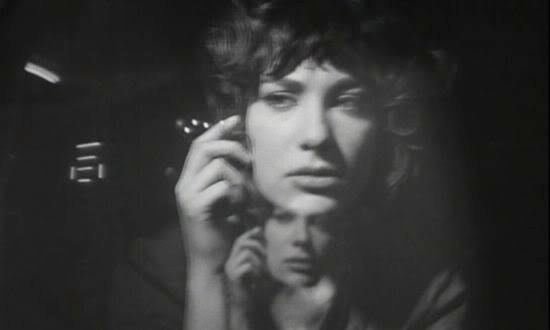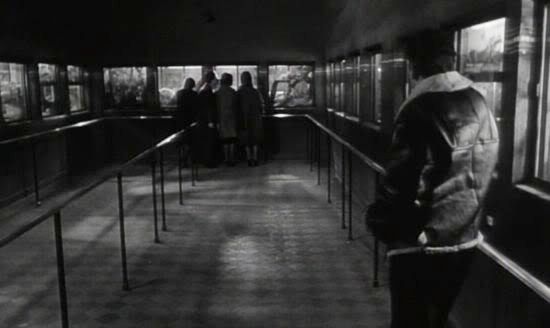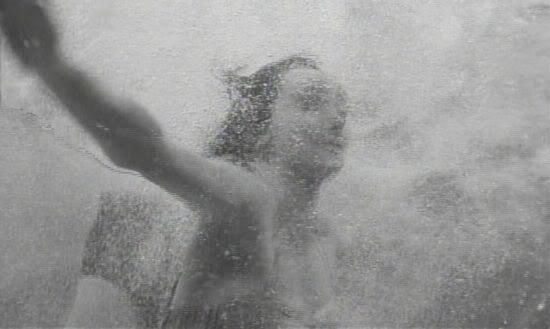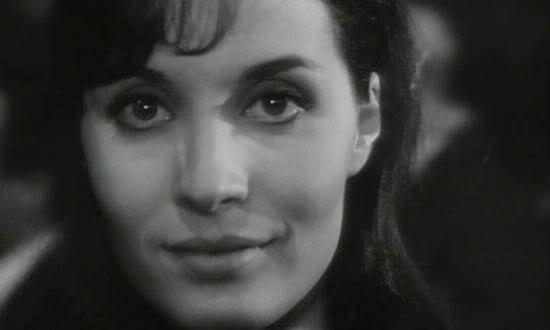Les Bonnes Femmes (Claude Chabrol, 1960)
 That poster prepares you for a summery romp with some girlfriends. The director, Claude Chabrol, prepares you for a mystery, as most of his films (none of which I have been particularly enamored with so far) have been tense, Hitchcock-ian thrillers. The first half of the film prepares you for an exploration of the lives of 60s Parisiennes, all seeming shallowness. But nothing in Les Bonnes Femmes prepares you for the sum of its parts, a feminist (?!) commentary on the lives of young girls in Paris that even has a murder in it, and ends on an incredibly depressing note.  Click on the picture to see my entire post of stills. Jane, Jacqueline, Ginette, and Rita are Parisian shopgirls who live apparently different, but essentially the same, lives. Jane (seen above, played by the stunningly beautiful Bernadette Lafont) is a party girl, and in the first scene, takes Jacqueline with her while she goes to a restaurant, a nightclub, and eventually, the apartment of two creepy strangers. Maybe they're not so creepy, though -- in the first scenes, they seem that way, but as the movie goes on and we're introduced to more men, they're more annoying than anything else. Ginette lives with Jane, and has a secret life as a nightclub singer. Rita is a normal girl who is trying to escape the banality of the shopgirl life by marrying up in class, even though her husband-to-be is snobby and condescending (so are his parents -- in one great moment, Rita meets his mother, who is wearing a giant diamond ring outside of her gloves. "I would have worn it on the inside," she says, "but it was just too big."). Jacqueline believes in true love, and is being followed around town by a man on a motorcycle by whom she is equally afraid of an intrigued by.  Men are terrible, pretty much. Jane bounces between men, using whomever she can to buy her a drink and give her a good time. This was the beginning of the 60s, and girls had the choice not to believe in love, and to believe in themselves instead. This implied promiscuity is not what makes Jane's (and Ginette's) life so unfulfilling; instead, it's the life in the store (9am-7pm doing nothing, it seems), the way men don't take her seriously (no didn't always mean no quite yet), the way everything in the world is set up for a different person than her. The first half of the film is quite boring, but on purpose. It's boring because these girls' lives are boring. I love the tactic of making a film boring on purpose to make a point.  But then Jacqueline meets the man on the motorcycle, and the film's tone changes significantly. (If you haven't seen the film but want to, here's where I suggest skipping to the end of the review) He seems sent from heaven at first; he saves the group from the two creeps at the public pool (by the way, why aren't there pools open until all hours of the night here?) and takes Jacqueline on a romantic motorcycle ride into the country and out to dinner. That's where things start to take a sinister turn. He begins acting erratic and weird during the meal, and during their walk afterward, tries to warn Jacqueline that he might not have been following her out of pure love. Jacqueline, being pure of heart and completely naive, replies that she doesn't have any money, what else could he want from her but love? Now, it seems ridiculous that a girl would completely trust and fall in love with a guy who has been following her around for days, but Jacqueline is so desperate for attention and love that she will take anything that comes her way. And she dies for it -- not, I think, as punishment, but as what Chabrol sees as the obvious ending of a life that's been taken for granted. Jacqueline's death is sad and scary and shocking, but it's not surprising. And that's the worst part.  The film ends with another random girl, waiting on the side of the dancefloor for a man to get her. We never see the man's face, and the girl looks directly at the camera, confronting the audience in our participation and voyeurism in this episode. Who would have thought such a striking attack on the Parisian status quo and feminist statement would have come from Chabrol? By far my favorite Chabrol film, and one of my favorites of the French New Wave. If I were teaching a feminist film class, this might be one I would start with. 8.5/10 Labels: 1960, claude chabrol |

Comments on "Les Bonnes Femmes (Claude Chabrol, 1960)"
post a comment